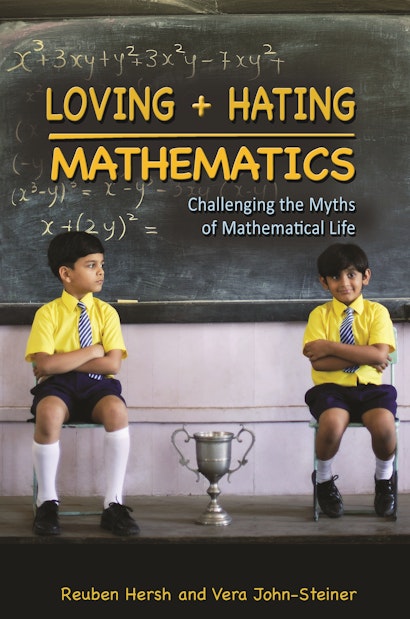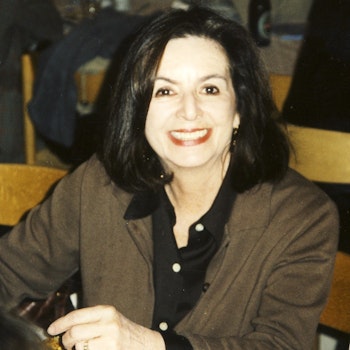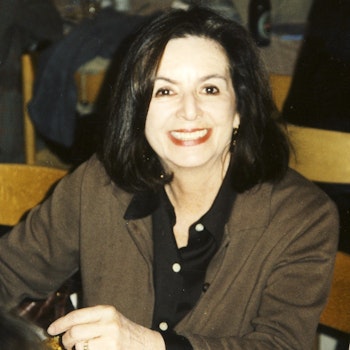Mathematics is often thought of as the coldest expression of pure reason. But few subjects provoke hotter emotions—and inspire more love and hatred—than mathematics. And although math is frequently idealized as floating above the messiness of human life, its story is nothing if not human; often, it is all too human. Loving and Hating Mathematics is about the hidden human, emotional, and social forces that shape mathematics and affect the experiences of students and mathematicians. Written in a lively, accessible style, and filled with gripping stories and anecdotes, Loving and Hating Mathematics brings home the intense pleasures and pains of mathematical life.
These stories challenge many myths, including the notions that mathematics is a solitary pursuit and a “young man’s game,” the belief that mathematicians are emotionally different from other people, and even the idea that to be a great mathematician it helps to be a little bit crazy. Reuben Hersh and Vera John-Steiner tell stories of lives in math from their very beginnings through old age, including accounts of teaching and mentoring, friendships and rivalries, love affairs and marriages, and the experiences of women and minorities in a field that has traditionally been unfriendly to both. Included here are also stories of people for whom mathematics has been an immense solace during times of crisis, war, and even imprisonment—as well as of those rare individuals driven to insanity and even murder by an obsession with math.
This is a book for anyone who wants to understand why the most rational of human endeavors is at the same time one of the most emotional.
"Loving and Hating Mathematics, by Reuben Hersh and Vera John-Steiner: Mathematicians also happen to be full of emotion."—Tyler Cowen, New York Times Magazine
"Mathematics gets a bad press. Its practitioners are often portrayed as aloof hyper-rationalists with oodles of logic but no emotional intelligence. Not so, say mathematician Reuben Hersh and linguist Vera John-Steiner. Focusing on the emotional side of the discipline, they reveal mathematicians' passions, collaborations and love affairs. The stories range from those who sought solace in equations to some who were driven to murder by a maths obsession."—Nature
"Wisely used, the book could infuse the important issue of students' emotions into debates about mathematics education."—Lynn Arthur Steen, Science
"The volume is quite entertaining, surprising in parts, and mostly convincing in its myth-demolition assignment."—Library Journal
"A book rescuing the full humanity of mathematicians from misleading stereotypes."—Booklist
"Provocative. . . . This thoroughly entertaining book highlights vitally important issues."—Tony Mann, Times Higher Education
"I do recommend the work to the interested mathematics observer . . . especially if you already love mathematics."—Math-Frolic blog
"There's material for a thousand movie scripts in the vignettes—warm, funny, tragic or horrifying—that stud the pages of Loving and Hating Mathematics. . . . [The authors] aim to put a human face on the impulses that drive us to—or from—math. . . . The book offers insights into an important world invisible to many of us."—Albuquerque Journal
"The book is heady with mathematical aha moments and will serve brilliantly as a virtual support group for mathematicians who feel isolated by the false notion that mathematicians are isolated."—Santa Fe New Mexican
"When it comes to the culture of mathematics, there are a few books by mathematicians, aimed at a general audience, that are extremely popular with mathematics faculty. As these books have aged, dozens more have appeared that reproduce some of their best quotes and anecdotes. Fortunately, Hersh and John-Steiner have gone beyond these classic sources and made use of many others. They have also included their own insights so that even an interested individual with a broad background will find much that is new in this up-to-date volume—enough to easily justify purchasing the work. For someone with a more limited exposure to popular mathematics, their book is even better."—Choice
"An entertaining, useful, and provocative book."—Anthony G. O'Farrell, Irish Mathematical Society Bulletin
"The inner circle of pure mathematicians will respond to the book with delight."—Philip J. Davis, SIAM News
"The descriptions in Loving and Hating are sympathetic and understandable. The lives that Hersh and John-Steiner have led have allowed them to get up-close and personal with a species (mathematicians, and more generally people whose work is creative thinking) whose world many people don't ordinarily get to see, and may welcome a window into."—Jonathan M. Borwein and Judy-anne Osborn, Mathematical Intelligencer
"[Loving and Hating Mathematics] . . . is easy to read; one does not need a degree in mathematics to make sense of the content. A major strength is the attention given to mathematicians of different nationalities, genders, and ethnicities. . . . I recommend this book to all mathematicians and mathematics educators."—Mathematics Teacher
"One can expect this book to become a classic."—Robert E. O'malley, Jr, SIAM Review
"Loving and Hating is a book filled with gems. We could open it on any page and find something interesting. It is imbued with the authors' love of mathematics and respect for people. The message that mathematics is a fundamentally human activity, in which people can find meaning and joy, is clearly conveyed."—Jonathan M. Borwein and Judy-Anne Osborn, Mathematical Intelligencer
"This is a marvelous book. . . . On the pages of this book there is always something more to keep one from putting it down. . . . This deftly written exploration of the strengths and foibles of mathematicians we see that on the whole mathematicians may not be all that different from those who have intellectually gone in other directions. Doing mathematics, like many other professional endeavors, is a human activity. Reading this book is unfailingly informative—it's also a lot of fun to read."—Gerald L. Alexanderson, American Mathematical Monthly
"This is a perceptive and compassionate book on the joys and terrors that learning mathematics often produces. It is also a rich example of the kinds of insights that come from the collaboration of a mathematician and a psychologist."—Jerome Bruner, author of The Process of Education
"This is a book for everyone who ever loved or hated mathematics. It shows mathematics as it really is: emotional, imaginative, beautiful, terrifying, deeply spiritual, metaphorical, and very political—anything but the dry, computational, right-or-wrong manipulation of symbols that is all too often taught as 'mathematics.'"—George Lakoff, University of California, Berkeley
"A Noah's Ark of mathematicians, their lives, loves, hard times, and madnesses, Loving and Hating Mathematics shows our community with all its warts as well as its triumphs. I especially liked the chapter on much-hated school mathematics, 'Almost All Children Left Behind.'"—David Mumford, former president, International Mathematical Union
"This book reminds me of James Gleick's Chaos. The ideas and stories in Loving and Hating Mathematics are timely, interesting, and sometimes even profound. The authors, writing for nonspecialists, take pains to explain technical ideas in nontechnical language, and the book should interest general readers as well as a large mathematical audience."—Steven G. Krantz, Washington University in St. Louis
"The authors explore a fascinating topic in colorful and compelling ways."—Howard Gardner, Harvard Graduate School of Education
"Loving and Hating Mathematics discusses subjects that are not normally addressed at all—the human, psychological, social, and cultural dimensions of math. The book contains a wealth of stories and anecdotes that together humanize mathematics, support a different way of thinking about its nature, and break down the barriers between math and the wider world. This is an interesting and important book."—William Byers, author of How Mathematicians Think



